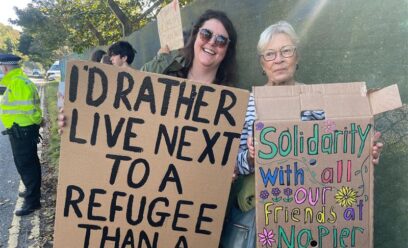International Women’s Day 2022: Grace Nine from Voice of Domestic Workers
Posted by IMIX on January 8, 2022International Women’s Day 2022: Q & A With Grace Nine from Voice of Domestic Workers.
Grace Nine is a Union Representative at The Voice of Domestic Workers (VoWD)and is a frontline campaigner using her lived experience to fight for the rights of migrant domestic workers in the UK.
Tell us about yourself.
My name is Grace Nine. I’m a single mother of four children. I am a domestic worker – that is my profession. Domestic work is a decent job. Through this job I was able to feed, educate, clothe, and provide medical care and shelter for my children. I first worked in Hong Kong and Kuwait before coming to the UK in 2013.
I am also one of the participants in Future Voices, a new training programme at VoDW aimed at equipping a new network of 12 migrant domestic workers with the skills and confidence to share our experiences, have our expertise heard more widely and ultimately drive public awareness and policy change. This is a pilot programme developed in partnership with charity sounddelivery media, who run a spokesperson network with leaders with lived experience.
What do you like about your role?
Like many fellow domestic workers, I also escaped from an abusive employer. I am now helping fellow domestic workers be rescued from abusive employers. I am very happy whenever I can help free my fellow domestic workers from being trapped in a private household.
No human being should be treated as a slave, people deserved to be treated as people and that includes domestic workers. My role as a trade union representative is not easy. It is challenging because I am dealing with employment disputes between employee and employer.
I need to be brave to show a good example that they don’t have to be frightened to speak-out about their grievances, because employers need domestic workers more than we need them.
Domestic workers can easily find new employment that is decent and not abusive employment.
We are also with Unite the Union, the largest trade union in the UK, where we have a bigger family. Campaigning for domestic workers’ rights is in the main agenda of Unite and is in every Labour Party conference. Unite and VoDW always have a joint side-meeting in Brighton.
Being part of Future Voices training, I am looking forward to being a good public speaker and to be able to directly lobby the government, who have been denying domestic workers our rights.
Do you feel that having lived experience has helped you in your job?
I would say my lived experience was an advantage because I could relay better to my fellow domestic workers who have been through the same. I could easily say while holding their hands that, “I am here, I survived and you will too. You have taken the first step, it will be rough but ahead there will be light.’’
What is the importance of having women with lived experience leading in the refugee and asylum sector?
The active participation and engagement of migrants and refugees are important especially if issues are about us. No one would really know what happened to us, and what we need if we don’t talk and engage. We are also the best people to bring our stories to life and use that to challenge inequality and injustices.
This year’s International Women’s Day theme is #BreakingTheBias. What are some biases or challenges that you have faced in your career?
Working in a very isolated private home, I was threatened by my employer that I would be arrested by police if I escaped and talked to people. I was afraid to talk to anyone because I was in constant fear of being arrested and deported. At that time, I didn’t know my rights and I didn’t know where to seek help. I once lost hope that I won’t be able to escape my abusive employer, who would lock me inside the house and left me with no food.
I truly believed that I was a slave. I believed that was normal in this country and that slavery was not a crime. Until one day, one window was unlocked and so I escaped. It wasn’t easy for me to rebuild my life because migrant domestic workers here have no rights.
We couldn’t renew our six Months Overseas Domestic Worker Visa once it lapsed. Most domestic workers who have failed in the trafficking assessment system as victims of modern slavery or trafficking end up undocumented, so there is no recourse to justice.
I was fortunate to find VoDW where I could access education, training, and legal support. As VoDW is run by and for migrant domestic workers, we are the voice of our rights and we campaign in the front line.
8 March, on International Women’s Day, I will be with my fellow members at VoDW in the parliament to deliver flowers to peers in the House of Lords to show our gratitude and lobby them to keep our rights and protection in the Nationality and Borders Bill. They will be debating and voting on amendment number 70A to fully reinstate the rights of migrant domestic workers that we lost in 2012. I hope the House of Lords will vote for domestic workers’ rights in the Bill. Here’s our joint briefing.
Finally, what advice would you give to women with lived experience about working in the refugee sector?
Every story matters. We need to speak out. So that will people begin to listen to us. When many of us are speaking out, the louder our voices are. Let us stand tall and be brave to fight for our rights. We all deserved to be treated equally with respect. I am the living evidence of “If I can do it, you can do it!”




